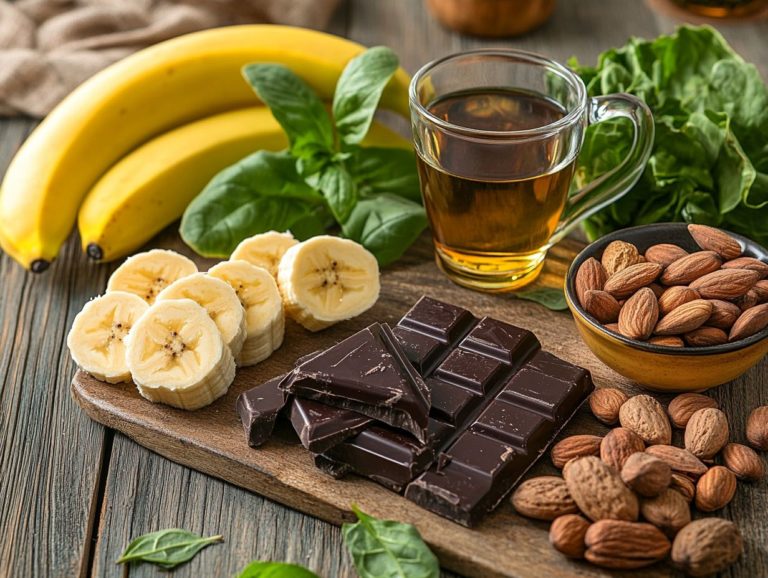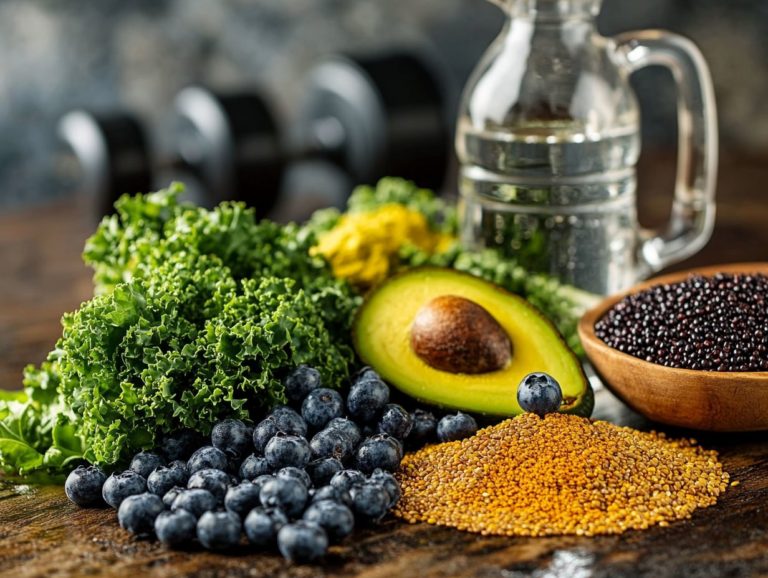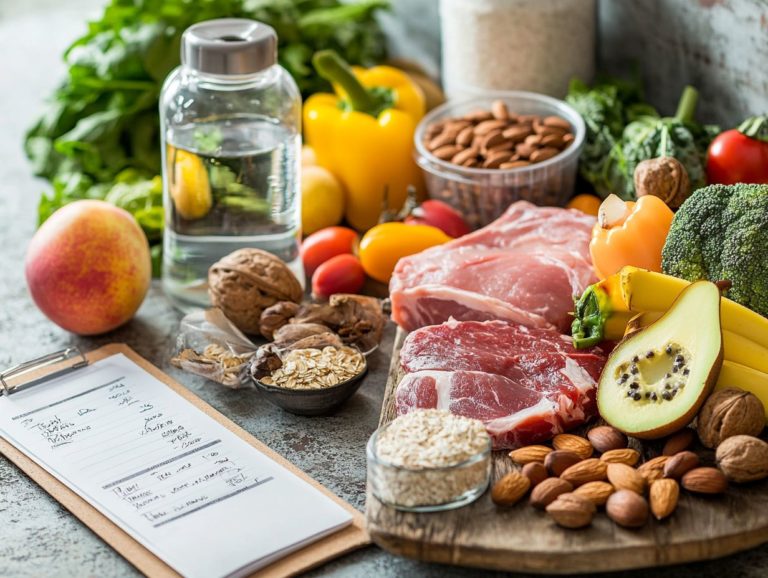Nutrition for Active Seniors: Staying Energized
As you age, your nutritional needs evolve, making it essential for you to focus on a balanced diet. Don t wait! Start making these changes today to feel your best!
Proper nutrition not only supports your physical health but also enhances your mental well-being and stamina. This article delves into the common nutritional needs for seniors, highlighting the key vitamins and minerals you should incorporate into your diet.
It offers practical healthy eating tips, effective meal planning strategies, and insights on how exercise can elevate your overall vitality. Specific health concerns will also be addressed to help you thrive.
Join us on this journey to discover delicious ways to energize your body!
Contents
Key Takeaways:

- Eating a well-balanced diet rich in vitamins and minerals is crucial for seniors to maintain energy levels and overall health.
- Seniors should focus on meal planning, portion control, and incorporating physical activity in order to stay energized and promote optimal health.
- Special considerations for seniors, such as addressing common health concerns, should be taken into account when planning a nutrition and exercise routine.
Why Nutrition is Important for Seniors
Nutrition is very important in preserving the overall health and well-being of seniors. It delivers the essential vitamins and minerals that are vital for sustaining energy levels, enhancing mental health, and supporting physical activity.
By embracing a well-rounded and balanced diet, older adults can effectively manage various health concerns. Prioritizing a healthy diet rich in lean proteins foods like chicken or fish that are low in fat whole grains, and healthy fats can profoundly improve vitality and longevity, ensuring that seniors remain active and engaged in their daily pursuits.
Common Nutritional Needs for Seniors
As you age, your nutritional needs evolve, necessitating a thoughtful approach to ensure you receive the vitamins and minerals essential for maintaining health and preventing disease. A balanced diet, rich in complex carbohydrates and lean proteins, is vital for sustaining your energy levels and enhancing your overall well-being.
Focus on nutrients like vitamin B12, calcium, and magnesium, as these play a critical role in supporting bone health and cognitive function.
Vitamins and Minerals to Focus on
For seniors, focusing on key vitamins and minerals can greatly enhance health outcomes, particularly vitamin B12, calcium, and magnesium. These nutrients play critical roles in maintaining bone density, cognitive function, and overall energy levels.
Ensuring that older adults stay adequately hydrated is equally essential, as dehydration can lead to serious health risks and hinder physical activity.
These nutrients are vital for various bodily functions, enabling you to enjoy a more active and independent lifestyle. For instance, vitamin B12 is crucial for nerve health and DNA synthesis, with fortified cereals, fish, and lean meats standing out as excellent sources. Calcium, often found in dairy products like yogurt and cheese, helps prevent osteoporosis, a common concern for older adults.
Similarly, magnesium, abundant in leafy greens, nuts, and whole grains, supports muscle function and energy production.
Incorporating these foods into daily meals can significantly mitigate the nutritional gaps that often arise with aging, allowing you to thrive in your golden years.
Healthy Eating Tips for Seniors

Healthy eating for seniors is about more than merely selecting the right foods; it s a thoughtful approach that includes mindful meal planning and portion control to ensure a balanced diet that meets their unique nutritional needs.
A well-structured eating plan helps older adults steer clear of refined carbs and unhealthy fats while incorporating essential nutrients that support their energy levels and overall health.
By embracing a variety of foods like fish, whole grains, and vibrant fruits you can create a colorful and nutritious plate that specifically caters to their dietary requirements.
Meal Planning and Portion Control
Effective meal planning and portion control are crucial for maintaining a balanced diet, especially for seniors. By managing their food intake this way, they can support optimal health.
Focusing on proper serving sizes and including a mix of food groups like healthy fats from nuts and seeds ensures they receive essential vitamins and minerals for sustained energy. Staying hydrated is key, so drink plenty of water and include hydrating foods in your meals.
Boost your meal planning by creating exciting shopping lists that highlight fresh produce and whole grains, which can form the foundation of nutritious meals. Preparing meals in advance not only saves time, but also helps you avoid those tempting unhealthy last-minute choices.
Achieving portion control can be as simple as using smaller plates and measuring out servings, making it easier to manage calorie intake.
Including a vibrant array of fruits and vegetables guarantees a diverse nutrient profile while keeping meals visually enticing and enjoyable. By making a conscious effort to stay hydrated and including foods that are rich in vitamins and minerals, you ll further enhance your overall well-being.
Exercise and Nutrition for Seniors
The interrelationship between exercise and nutrition is crucial for seniors. By maintaining an active lifestyle alongside a nutritious diet focused on superfoods for longevity, you can significantly boost your energy levels and support your mental well-being.
Regular exercise helps you manage your weight and move better, making your healthy meals work even harder for you. It also amplifies the benefits of a healthy diet filled with lean proteins, complex carbohydrates, and essential vitamins and minerals.
Together, exercise and nutrition create a holistic approach that allows you to age gracefully and sustainably.
Combining Physical Activity and Nutrition for Optimal Health
Combining physical activity with a healthy diet is essential for seniors seeking optimal health. It cultivates a robust body and mind, equipping you to tackle the challenges of aging.
Engaging in regular exercise enhances the effectiveness of a balanced diet and allows you to absorb essential nutrients more effectively, helping you maintain energy levels throughout the day. Focusing on foods rich in omega-3 fatty acids, antioxidants, and fiber provides the necessary fuel for an active lifestyle.
Specific nutrients play a vital role in supporting your physical activity. For instance, vitamin D is crucial for enhancing bone strength, which aids your mobility and coordination.
Incorporating protein-rich foods, such as lean meats, legumes, and dairy, can facilitate muscle recovery after workouts, ensuring you remain strong and resilient. Pairing your meals with nutrient-dense snacks like nuts or yogurt can sustain your energy levels and keep you motivated in your active routine.
Implementing simple strategies, such as planning your meals around post-exercise refueling, can lead to a harmonious relationship between your diet and fitness.
Special Considerations for Seniors

When considering the nutritional needs of seniors, it s essential to account for specific health concerns that may emerge, such as magnesium deficiency, low iron levels, and hydration issues.
Tailoring dietary choices to address these challenges can profoundly enhance the well-being of older adults, ensuring they receive the vitamins and minerals necessary for thriving. By focusing on nutrient-dense foods and maintaining consistent hydration, you can effectively manage these important considerations.
Addressing Common Health Concerns
Addressing common health concerns in seniors requires a focus on nutrition, emphasizing the key vitamins and minerals that cater to their unique needs.
Conditions such as dehydration and low iron can be effectively managed with a balanced diet that emphasizes hydration and nutrient-rich foods like beans, spinach, and berries.
Ensuring an adequate intake of vitamin B12 can significantly contribute to maintaining cognitive function and overall vitality.
Other challenges, such as osteoporosis and a weakened immune system, can be supported by incorporating foods rich in calcium, like yogurt and kale, alongside vitamin D-rich sources such as fatty fish.
To promote hydration, aim to drink water regularly throughout the day, even if you don t feel thirsty; the sense of thirst tends to decrease with age.
Including soups and water-rich fruits can also help maintain proper hydration levels.
A balanced diet tailored to these nutritional needs enhances the quality of life and longevity for older adults.
Frequently Asked Questions
Energizing Foods for Seniors
Stay energized with these simple dietary choices! As a senior, choose foods high in nutrients that provide sustained energy. For tailored advice, check out nutrition for office workers: staying energized. Include whole grains, lean proteins like chicken and fish, and healthy fats such as avocado and nuts.
How Much Water Should Active Seniors Drink?

Staying hydrated is essential for maintaining energy levels. Active seniors should aim to drink at least 8-10 glasses of water per day, and even more if exercising or in hot weather.
Do Active Seniors Need Supplements for Energy?
While supplements can help address nutrient deficiencies, it’s best to get most vitamins and minerals from whole food sources. A balanced and varied diet should provide all necessary nutrients for staying energized.
Can Caffeine Boost Energy for Active Seniors?
Caffeine can provide a temporary energy boost, but seniors should be mindful of their intake and not rely on it too heavily. Too much caffeine can disrupt sleep and cause other side effects.
Foods to Avoid for Optimal Energy as a Senior
Processed foods, sugary snacks, and high-fat meals can contribute to feelings of fatigue and should be limited or avoided. Instead, focus on whole, nutrient-dense foods rich in vitamins and minerals.
Consulting a Nutritionist for Personalized Guidance
Consulting a healthcare professional before making significant dietary changes is always a good idea. A nutritionist can provide tailored advice, including nutrition for seniors: tips for healthy aging, to help you stay energized and healthy as an active senior.
Consider your hydration and diet for better energy levels!






